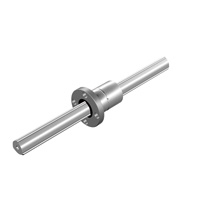(!) Since support from Microsoft will end on January 14th, 2020, Windows 7 will be excluded from the recommended environment from December 15th, 2019 on this site. Vì lý do Microsoft kết thúc hỗ trợ cho Windows 7 vào ngày 14/01/2020, Windows 7 sẽ là hệ điều hành không được khuyến khích sử dụng với trang web này từ ngày 15/12/2019.
Search by Category / Brand Tìm theo danh mục, nhãn hiệu
Search by Category Tìm theo danh mục
- Scheduled Maintenance Notice: This site will be unavailable due to scheduled maintenance from 8:00 19/1/2025 to 5:00 (ICT) 20/1/2025. We apologize for the inconvenience.
- [Thông báo] Cập nhật địa chỉ kho tập kết hàng hóa tại khu vực miền Nam của MISUMI Việt Nam. Xem chi tiết.
[Announcement] Update on warehouse address in the Southern region of MISUIMI Vietnam. See more. - [Cảnh Báo] Thủ Đoạn Lừa Đảo Từ Nhân Viên Giao Hàng – Yêu Cầu Trả Phí Ship. Xem chi tiết.
[Warning] Fraud Calling from Shipper - Asking to Pay Shipping Fee. See more.
THK Spline Shaft(Accuracy Grade:Standard Grade)
|
Nut Type
|
|
|---|---|
Brand |
|
| CAD |
|
| Days to Ship |
|
2 itemsMặt hàng
- Sort By
-
You can add up to 6 items per a category to the compare list.

High Torque Flange Type Ball Spline Model LBF (Medium Load Type)
THK
Utilizes a flange to fixate the housing using a bolt, which makes assembly easy. Ideal for housings with small widths or where there are concerns of deformation associated with machining key grooves into the housing.
Nut Type Spline Shaft Outer Dia. D(Ø) Type Nut Length Nut Overall Length L1(mm) Nut Outer Dia. D1(Ø) Preload Accuracy Grade End Shape (Left) End Shape (Right) Torque Shaft material Number of Nuts(pc(s).) Flanged Type - Solid Standard 40 23 Standard / Light Preload / Medium Preload Standard Grade Standard Standard High Torque - 1 Days to Ship: Số ngày giao hàng: 20 Day(s) or more  20 Day(s) or more
20 Day(s) or more
-
You can add up to 6 items per a category to the compare list.

Medium-Torque Type, Flange Type Ball Spline, LF Type
THK
Utilizes a flange to fixate the housing using a bolt, which makes assembly easy. Ideal for housings with small widths or where there are concerns of deformation associated with machining key grooves into the housing.
Nut Type Spline Shaft Outer Dia. D(Ø) Type Nut Length Nut Overall Length L1(mm) Nut Outer Dia. D1(Ø) Preload Accuracy Grade End Shape (Left) End Shape (Right) Torque Shaft material Number of Nuts(pc(s).) Flanged Type - Solid / Hollow / Hollow (Thin) Standard 125 80 Standard / Light Preload / Medium Preload Standard Grade Standard Standard Middle Torque - 1 ~ 5 Days to Ship: Số ngày giao hàng: 43 Day(s) or more  43 Day(s) or more
43 Day(s) or more
| BrandNhãn hiệu |
|---|
| Product SeriesDòng sản phẩm |
| CADCAD |
| From |
| Days to ShipSố ngày giao hàng |
| Nut Type |
| Spline Shaft Outer Dia. D(Ø) |
| Type |
| Nut Length |
| Nut Overall Length L1(mm) |
| Nut Outer Dia. D1(Ø) |
| Preload |
| Accuracy Grade |
| End Shape (Left) |
| End Shape (Right) |
| Torque |
| Shaft material |
| Number of Nuts(pc(s).) |
You can add up to 6 items per a category to the compare list. | You can add up to 6 items per a category to the compare list. | |
| BrandNhãn hiệu | THK | THK |
| Product SeriesDòng sản phẩm | High Torque Flange Type Ball Spline Model LBF (Medium Load Type) | |
| CADCAD |
|
|
| From | - | - |
| Days to ShipSố ngày giao hàng | 20 Day(s) or more | 43 Day(s) or more |
| Nut Type | Flanged Type | Flanged Type |
| Spline Shaft Outer Dia. D(Ø) | - | - |
| Type | Solid | Solid / Hollow / Hollow (Thin) |
| Nut Length | Standard | Standard |
| Nut Overall Length L1(mm) | 40 | 125 |
| Nut Outer Dia. D1(Ø) | 23 | 80 |
| Preload | Standard / Light Preload / Medium Preload | Standard / Light Preload / Medium Preload |
| Accuracy Grade | Standard Grade | Standard Grade |
| End Shape (Left) | Standard | Standard |
| End Shape (Right) | Standard | Standard |
| Torque | High Torque | Middle Torque |
| Shaft material | - | - |
| Number of Nuts(pc(s).) | 1 | 1 ~ 5 |
Loading...Tải…
ConfigureTạo
Specification/DimensionsĐặc điểm kỹ thuật / Kích thướcĐặc điểm kỹ thuật / Kích thước
-
Spline Shaft Outer Dia. D(Ø)
-
Type
- Solid
- Hollow
- Hollow (Thin)
- Polygonal
-
Nut Length
-
Nut Overall Length L1(mm)
-
Nut Outer Dia. D1(Ø)
-
Preload
-
Accuracy Grade
-
End Shape (Left)
-
 Standard
Standard -
 Tapped
Tapped -
 Stepped
Stepped -
 Stepped and Tapped
Stepped and Tapped -
 Stepped and Threaded
Stepped and Threaded
-
-
End Shape (Right)
-
 Standard
Standard -
 Tapped
Tapped -
 Stepped
Stepped -
 Stepped and Tapped
Stepped and Tapped -
 Stepped and Threaded
Stepped and Threaded
-
-
Torque
- High Torque
- Middle Torque
-
Shaft material
- SCM415 Equivalent
- SUJ2
- SUS440C Equivalent
- SUS304
- SUJ2 Equivalent
-
Number of Nuts(pc(s).)
Application example related to this categoryVí dụ ứng dụng liên quan đến danh mục này
Related Categories to Spline ShaftDanh mục liên quan đến Spline Shaft
FAQ Spline Shaft
- Question: What are spline shafts and their primary function in linear motion?
- Answer: Spline shafts are cylindrical rods with ridges or teeth along their length, known as splines. Their primary function in linear motion is to convert rotational motion into smooth and precise linear movement. These splines engage with complementary components to transmit torque efficiently, ensuring controlled motion without slipping or backlash. Spline shafts are crucial in various machinery applications where accurate linear motion is required, such as moving heavy loads or guiding tools with precision, providing reliable and efficient motion control.
- Question: Can you explain the key characteristics of square splines?
- Answer: Square splines feature square-shaped ridges and slots, offering efficient torque transmission and precise alignment. Their design allows for high torque capacity and compatibility with various mating components. Due to their simplicity of manufacture, they are cost-effective for many applications. Additionally, the even distribution of wear along the mating surfaces enhances durability. Square splines are widely used in industrial and mechanical systems where accurate motion control and reliable torque transmission are essential.
- Question: What role do spline shafts play in automotive transmissions?
- Answer: Spline shafts are essential in automotive transmissions for transferring power from the engine to the wheels. They connect parts like the clutch and gears, ensuring smooth power transmission. By enabling the engine's rotational motion to move the wheels with precision, they allow the vehicle to accelerate, decelerate, and shift gears seamlessly. Essentially, spline shafts ensure that your car moves smoothly and efficiently, contributing to its overall performance and driving experience.
- Question: What factors should be considered when choosing a spline shaft?
- Answer: When selecting a spline shaft, it's important to consider factors like the application's torque, speed, and precision requirements. Choose a spline profile and dimensions that match mating components to ensure efficient power transmission. Material selection is key for strength and corrosion resistance. The surface finish impacts durability, while manufacturing methods and costs should be evaluated. Supplier reliability is also crucial. By carefully considering these factors, you can choose a spline shaft that meets your application's needs effectively, ensuring optimal performance and longevity.
- Question: What materials are commonly used for manufacturing spline shafts?
- Answer: Spline shafts are commonly made from materials like steel, aluminum, brass, bronze, titanium, and plastics. Steel offers strength and durability, while aluminum is lightweight. Brass and bronze provide corrosion resistance. Titanium is strong and corrosion-resistant, ideal for demanding environments. Plastics offer benefits like low friction and electrical insulation. The choice depends on factors such as strength, corrosion resistance, weight, and cost.
- Question: What are the maintenance requirements for spline shafts?
- Answer: Maintaining spline shafts involves regular checks for wear, damage, and corrosion. Keep them lubricated to reduce friction and ensure smooth operation. Clean them regularly to prevent dirt buildup. Properly align mating components to avoid unnecessary stress on the shafts. Promptly replace any worn or damaged shafts to prevent further issues. Protect spline shafts from harsh environments and store them correctly when not in use. Following these steps will help ensure the longevity and efficient performance of spline shafts in machinery and equipment.
- Question: How do nut types of influence spline shaft functionality?
- Answer: The type of nut used can significantly affect spline shaft functionality. Slotted nuts provide anti-rotation, ensuring the nut and shaft move together for enhanced torque transmission. Hex nuts offer stability with six sides but lack anti-rotation features. Lock nuts prevent unintentional loosening, employing mechanisms like nylon inserts or serrations. Flange nuts distribute load over a wider area with a built-in washer-like flange. Self-locking nuts have integrated locking features to prevent loosening due to vibrations or external forces. Each type suits specific applications based on torque requirements, environmental conditions, and space constraints.
























How can we improve?
How can we improve?
While we are not able to respond directly to comments submitted in this form, the information will be reviewed for future improvement.
Customer Privacy Policy
Thank you for your cooperation.
While we are not able to respond directly to comments submitted in this form, the information will be reviewed for future improvement.
Please use the inquiry form.
Customer Privacy Policy